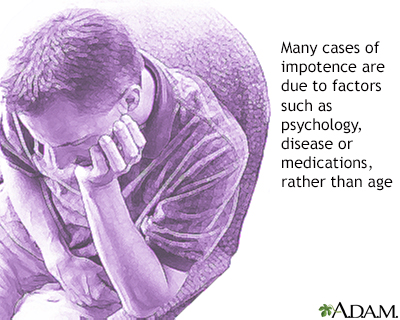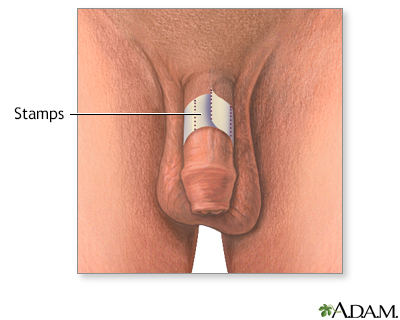Pregnancy SmartSiteTM
Erectile dysfunction; ED; Impotence; Sexual dysfunction - male DefinitionAn erection problem occurs when a man cannot get or keep an erection that is firm enough for intercourse. You may not be able to get an erection at all. Or, you may lose the erection during intercourse before you are ready. Erection problems do not usually affect your sex drive. Erection problems are common. Almost all adult men have trouble getting or keeping an erection at one time or another. Often the problem goes away with little or no treatment. But for some men, it can be an ongoing problem. This is called erectile dysfunction (ED). If you have trouble getting or keeping an erection more than 25% of the time, you should see your health care provider. CausesTo get an erection, your brain, nerves, hormones, and blood vessels all need to work together. If something gets in the way of these normal functions, it can lead to erection problems. An erection problem is usually not "all in your head." In fact, most erection problems have a physical cause. Below are some common physical causes. Disease:
Medicines:
Other physical causes:
In some cases, your emotions or relationship problems can lead to ED, such as:
Erection problems can affect men at any age, but are more common as you get older. Physical causes are more common in older men. Emotional causes are more common in younger men. If you have erections in the morning or at night while you sleep, it is likely not a physical cause. Most men have 3 to 5 erections at night that last about 30 minutes. Talk with your provider about how to find out if you have normal nighttime erections. SymptomsSymptoms may include any of the following:
Exams and TestsYour provider will perform a physical exam, which may include:
Your provider will also ask questions to help find the cause, such as:
Your provider will also ask about your lifestyle:
You may have a number of different tests to help find the cause, such as:
TreatmentThe treatment may depend on what is causing the problem and how healthy you are. Your provider can talk with you about the best treatment for you. For many men, lifestyle changes can help. These include:
If you and your partner have trouble talking about your relationship, it may cause problems with sex. Counseling can help both you and your partner. Lifestyle changes alone may not be enough. There are many treatment options.
ED pills can have side effects. These can range from muscle pain and flushing to heart attack. Do not use these drugs with nitroglycerin. The combination can cause your blood pressure to drop. You may not be able to use these drugs if you have any of the following conditions:
Other treatments also have possible side effects and complications. Ask your provider to explain the risks and benefits of each treatment. You may see many herbs and supplements that claim to help sexual performance or desire. However, none have been proven to successfully treat ED. Plus, they may not always be safe. Do not take anything without talking with your provider first. Outlook (Prognosis)Many men overcome erection problems with lifestyle changes, treatment, or both. For more severe cases, you and your partner may have to adjust to how ED affects your sex life. Even with treatment, counseling can help you and your partner overcome the stress ED may put on your relationship. Possible ComplicationsAn erection problem that does not go away can make you feel bad about yourself. It can also harm your relationship with your partner. ED may be a sign of health problems such as diabetes or heart disease. So if you have an erection problem, do not wait to seek help. When to Contact a Medical ProfessionalContact your provider if:
If you think any medicine you are taking may be causing erection problems, talk with your provider. You may need to lower the dose or change to another drug. Do not change or stop taking any medicine without first talking to your provider. Talk to your provider if your erection problems have to do with a fear of heart problems. Sexual intercourse is usually safe for men with heart problems. Call your provider right away or go to an emergency room if you are taking ED medicine and it gives you an erection that lasts for more than 4 hours. PreventionTo help prevent erection problems:
ReferencesAmerican Urological Association: Urology Care Foundation website. What is erectile dysfunction? www.urologyhealth.org/urologic-conditions/erectile-dysfunction(ed). Updated June 2018. Accessed October 23, 2023. Burnett AL, Ramasamy R. Evaluation and management of erectile dysfunction. In: Partin AW, Dmochowski RR, Kavoussi LR, Peters CA, eds. Campbell-Walsh-Wein Urology. 12th ed. Philadelphia, PA: Elsevier; 2021:chap 69. Burnett AL, Nehra A, Breau RH, et al. Erectile dysfunction: AUA guideline. J Urol. 2018;200(3):633-641. PMID: 29746858 pubmed.ncbi.nlm.nih.gov/29746858/. | |
| |
Review Date: 10/13/2023 Reviewed By: Linda J. Vorvick, MD, Clinical Professor, Department of Family Medicine, UW Medicine, School of Medicine, University of Washington, Seattle, WA. Also reviewed by David C. Dugdale, MD, Medical Director, Brenda Conaway, Editorial Director, and the A.D.A.M. Editorial team. The information provided herein should not be used during any medical emergency or for the diagnosis or treatment of any medical condition. A licensed medical professional should be consulted for diagnosis and treatment of any and all medical conditions. Links to other sites are provided for information only -- they do not constitute endorsements of those other sites. No warranty of any kind, either expressed or implied, is made as to the accuracy, reliability, timeliness, or correctness of any translations made by a third-party service of the information provided herein into any other language. © 1997- A.D.A.M., a business unit of Ebix, Inc. Any duplication or distribution of the information contained herein is strictly prohibited. | |

 Impotence and age
Impotence and age Erection self-test
Erection self-test
